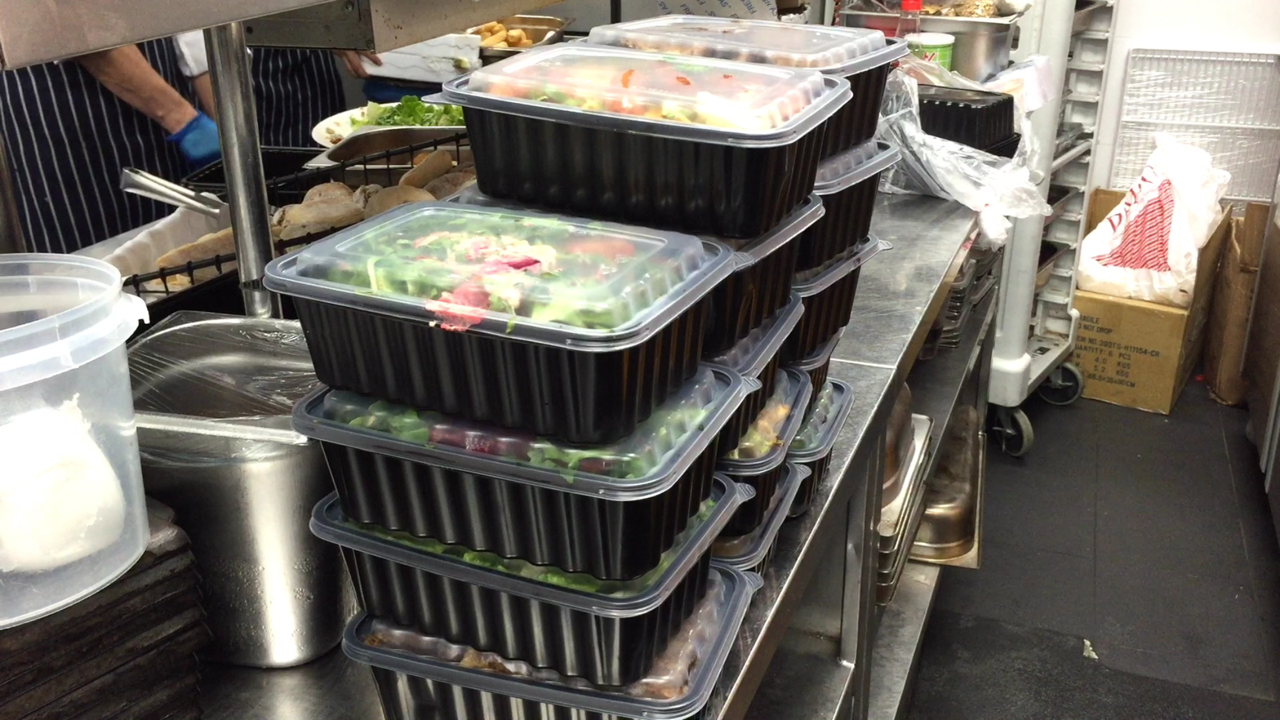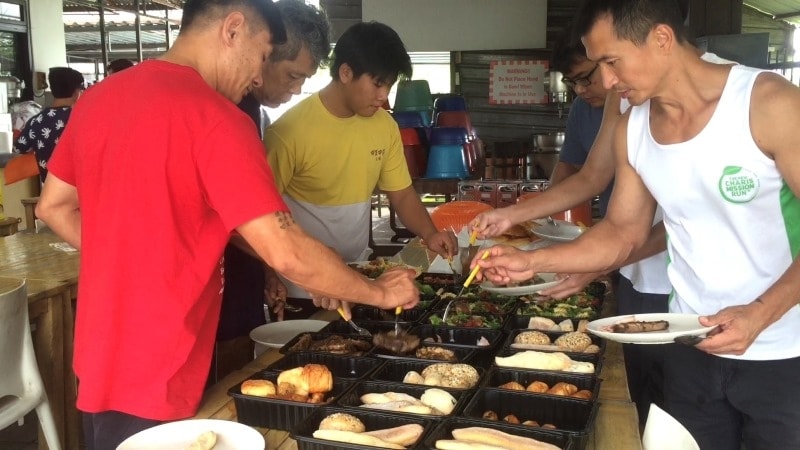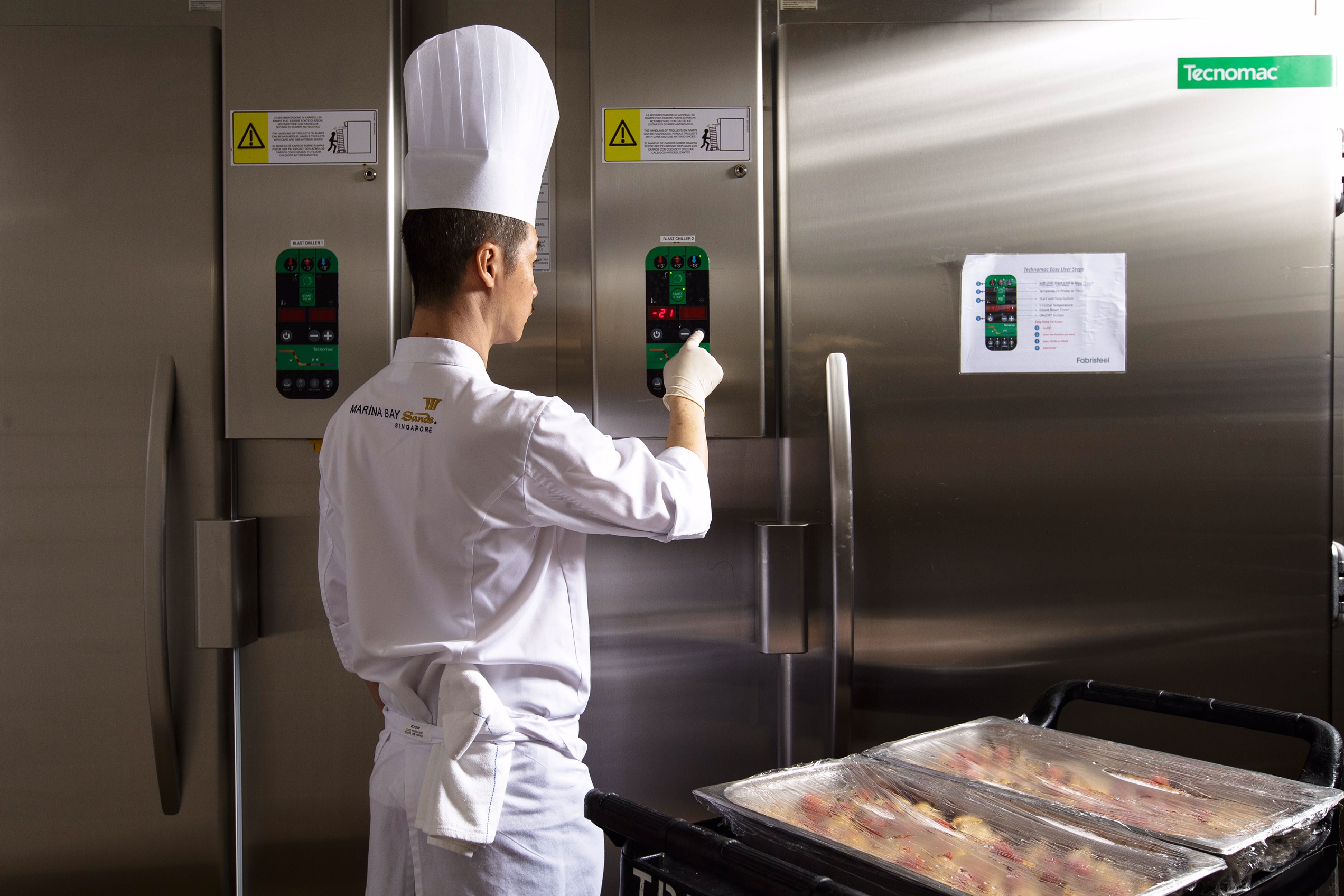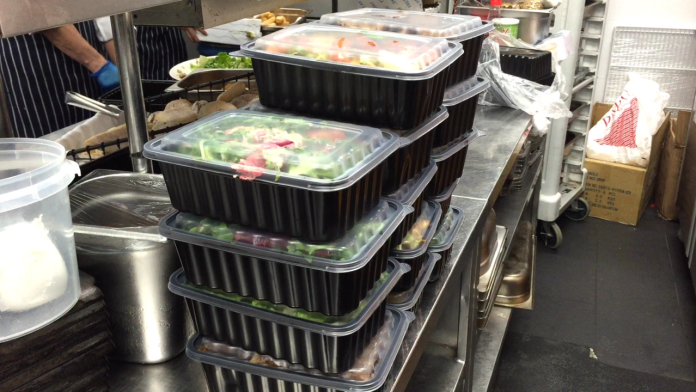SINGAPORE: Pork ribs, roast beef, pastas and cold cuts – all this leftover food from restaurant LeVeL33’s buffet used to be tossed out with the garbage.
But in July this year, the upmarket establishment in Marina Bay decided to put the uneaten food to a better use, giving it away to the Hiding Place, a drug rehabilitation halfway house in Choa Chu Kang.
“(We) believe in zero wastage (and) sustainability, with the highest priority in giving back to those who are disadvantaged,” said a spokesperson from LeVeL33.
Every Saturday, the excess from the restaurant’s brunch buffet is packed into small containers and picked up by Hiding Place staff. The food is usually enough for about 20 people.

LeVeL33 packs excess food into small containers which will be picked up by the Hiding Place staff. (Photo: Lim Jia Qi)
While some people might reject such food as leftovers, the beneficiaries at The Hiding Place see it as a welcome treat.
“Every week we get this food and we are really blessed because it is very fresh. Frankly speaking, this is part of a luxury for us…because all this is very good food,” said Satiyan Sankaran, 62, as he scraped up the last bit of food that was left on his plate.
“Even when we are in Singapore, in a rich country, there are still people who don’t have such luxuries that we are having and I want to thank the various establishments for giving us this food,” Mr Sankaran added.

Beneficiaries at The Hiding Place helping themselves to the food donated by LeVeL33. (Photo: Lim Jia Qi)
But while LeVeL33 is putting excess food to better use, statistics suggest that its strategy is not being widely adopted: Over the past decade, the amount of food waste generated in Singapore has increased by about 45 per cent to 790,000 tonnes in 2015. And only 13 per cent of it was recycled and the remaining 87 per cent was disposed of.
MORE COMPANIES DONATING PERISHABLE FOODS
Nevertheless, a trend seems to be developing that more companies are donating excess perishable food to those in need via charities and non-profit organisations.
In 2014, Marina Bay Sands (MBS) started giving dry food such as bread to Food from the Heart, which distributes food to those in need. And since May, the hotel started giving away unserved food from its banquets to the less fortunate via the Food Bank Singapore.
“The largest segment of our waste stream is food waste. If you can develop solutions around that, it makes really good sense for your business,” said Kevin Teng, MBS’ executive director of sustainability. So far, the hotel has donated about 500kg to 800kg of banquet items.
Before it started to make the donations, MBS wanted to ensure it could do so without the food spoiling. It now blast chills items before they are passed on for distribution. “We spent nearly a year doing it in-house and taking microbial tests for the food. I think liability is absolutely a concern but we can take measures and methodical steps to minimise it as best as possible,” Mr Teng added.

MBS blast chills its food before giving it away. (Photo: MBS)
Besides MBS, the Food Bank Singapore has also seen more partners contributing to its Food Rescue Project, which collects cooked food from restaurants and eateries and distributes it to the needy. Started last year, the programme currently has about 12 partners such as online supermarket RedMart and Hilton Singapore.
In recent months, BreadTalk has also jumped on the bandwagon, donating its unsold bread to Food from the Heart.
But charity organisations hope that more food establishments can be persuaded to come forth to donate.
NOT ENOUGH FOOD DONATIONS
“With the amount of food that is going around, it’s definitely not enough,” said Anson Quek, executive director of Food from the Heart. The organisation, which redistributes bread and non-perishable food items, has so far collected about S$700,000 worth of food items this year, to support 25,000 beneficiaries. The group hopes to expand its network and support 50,000 beneficiaries by 2018.
“There are about 105,000 HDB households living with a gross household income of less than S$1,500. So, if you multiply by four, you are talking about half a million people living under those conditions. We are just touching the surface,” said Mr Quek.
But Mr Quek noted that many companies still have the mindset that their brand would be affected if anything happens to those who are given leftover food.
“Some organisations are concerned that if their food is given out to the recipients and if anything happens after consuming it, such as food poisoning, they are afraid that it will tarnish their brand image,” said Mr Quek.
Co-founder of the Food Bank Singapore Nichol Ng agreed, saying that many companies are worried about their brand.
“It’s not just about after people eating and then geting diarrhoea. We have met businesses – some local brands, large brands – (and) the owners actually said ‘Can you ensure me that your drivers do not let people know that I’m donating food to you?’ Because they equate food donation to excess food to lousy business,” said Ms Ng.
To assuage concerns and streamline the process of food donation, the National Environment Agency (NEA) and the Agri-Food and Veterinary Authority (AVA) launched a guide in October that outlines steps for companies who wish to donate their unsold and excess food to charity organisations.
TAX REBATES AND GOOD SAMARITAN LAW TO INCREASE FOOD DONATION
Mr Quek pointed out that the guide is a first step towards reducing food waste at the national level but having a so-called Good Samaritan law in Singapore would encourage more companies to give away their excess food.
Currently, the United States and Panama are among the countries that have such laws which protect donors from civil and criminal liability arising out of food donations.
“It gives the donors a sense of assurance. And if I donate food, it’s out of goodwill and I will not be penalised in the event if there is any incident. It’s one way to encourage food donors to come forward,” said Mr Quek.
Crowne Plaza’s senior distribution and relationship marketing manager Aileen Yong said the hotel would consider donating its excess cooked food if there was a similar law in Singapore. “If there is a law like that we may consider because we also want charities to benefit from the extra food that we have,” she said.
“Because of the food safety regulations, we try not to distribute food outside of the hotel. We are concerned that if they bring the food out of the hotel, if they leave it under the sun for too long, if the food is spoilt and if they are not aware, it might cause a health risk,” she added.
Having a Good Samaritan law would alleviate some of those concerns, but Ms Ng said having some tax incentives would be more effective to get companies to donate food.
“What will really push people is if there is a tax rebate for donations which include food. So now for all donations in dollars, there is a 250 per cent tax rebate. So, if we have that I think food donations will increase drastically,” she said. “Because on the companies’ balance sheets, their profit and loss, instead of treating the food as a complete write off, they can look at it as a donation and get some kickbacks.”
Mr Quek urged companies who are hesitant to donate their excess food to participate in their food distribution activities.
“For companies who are not sure about food donation, participate in our food distribution. Go down to the ground with to see who are the beneficiaries so they know where the food goes to. It will give them a peace of mind.”
For Mr Sankaran, he is grateful to LeVeL33 and other companies for their generosity. “This is all good food. As far as I’m concerned and these boys here, we are really blessed and thankful.” he said.





